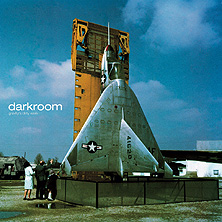 Burning
Shed always struck me as a funny name for a record label but the 2014
CD from the band known as Darkroom is no laughing matter. Over
the past several years, Burning Shed has become synonymous with cutting
edge prog by carrying a number of albums associated with King Crimson
and other well known prog rockers. One such album, the Darkroom CD
Gravity’s Dirty Work is a work filled with spellbinding
soundscapes that superbly spotlights the guitar of Michael Bearpark
and the keyboards / electronics of Andrew Ostler. Very
Crimson-esque in places, Gravity’s Dirty Work features
eight extended pieces of instrumental magic that crosses borders between
New Age atmospherics and avant gard suspense—although
unlike much New Age, this Darkroom CD is not meant to relax to. Commenting
on the wide ranging comparisons made of their music, Michael Bearpark
explains, 'We’re not aiming for a specific market. I don’t
have a big problem with the term New Age specifically... there’s
as much Suzanne Ciani as there is Delia Derbyshire in our music—also
ambient, Krautrock, progressive rock, discredited for some time, and
much else. People hear what they want in our music... We did set out
to make an ambient album, but that was just a starting point—what’s
left is something reflective, but quite different.' Darkroom have
a number of releases to their credit and their best yet, Gravity’s
Dirty Work is a splendid introduction to their sound. Plus, the
Gravity’s Dirty Work CD cover art is excellent for those
who still care about the packaging of art and music. Gravity’s
Dirty Work is very ambient and spacy, and Darkroom manages to
bring their sound into the 21st century with unique and successful
results. Adventurous New Age music fans with a bent for near psychedelic
Hendrix / Fripp like guitar-scapes and other sonic wizardry must give
Darkroom a listen. Gravity’s Dirty Work is well worth
the time for fans of prog-rock and ambient instrumental guitar-scapes.
www.DarkroomTheBand.net
Burning
Shed always struck me as a funny name for a record label but the 2014
CD from the band known as Darkroom is no laughing matter. Over
the past several years, Burning Shed has become synonymous with cutting
edge prog by carrying a number of albums associated with King Crimson
and other well known prog rockers. One such album, the Darkroom CD
Gravity’s Dirty Work is a work filled with spellbinding
soundscapes that superbly spotlights the guitar of Michael Bearpark
and the keyboards / electronics of Andrew Ostler. Very
Crimson-esque in places, Gravity’s Dirty Work features
eight extended pieces of instrumental magic that crosses borders between
New Age atmospherics and avant gard suspense—although
unlike much New Age, this Darkroom CD is not meant to relax to. Commenting
on the wide ranging comparisons made of their music, Michael Bearpark
explains, 'We’re not aiming for a specific market. I don’t
have a big problem with the term New Age specifically... there’s
as much Suzanne Ciani as there is Delia Derbyshire in our music—also
ambient, Krautrock, progressive rock, discredited for some time, and
much else. People hear what they want in our music... We did set out
to make an ambient album, but that was just a starting point—what’s
left is something reflective, but quite different.' Darkroom have
a number of releases to their credit and their best yet, Gravity’s
Dirty Work is a splendid introduction to their sound. Plus, the
Gravity’s Dirty Work CD cover art is excellent for those
who still care about the packaging of art and music. Gravity’s
Dirty Work is very ambient and spacy, and Darkroom manages to
bring their sound into the 21st century with unique and successful
results. Adventurous New Age music fans with a bent for near psychedelic
Hendrix / Fripp like guitar-scapes and other sonic wizardry must give
Darkroom a listen. Gravity’s Dirty Work is well worth
the time for fans of prog-rock and ambient instrumental guitar-scapes.
www.DarkroomTheBand.net
mwe3.com presents an interview with
Andrew Ostler and Michael Bearpark
of DARKROOM
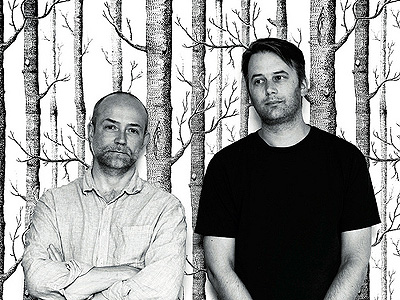 mwe3:
Where are you from in the U.K. and where do you live now and how would
you describe the area you live in now?
mwe3:
Where are you from in the U.K. and where do you live now and how would
you describe the area you live in now?
Andrew Ostler: I’m from Somerset originally. I currently
live in Letchworth Garden City, which I normally describe as “just
north of London”, which pretty much sums it up. It’s a good
place to live and raise children, if you don’t actually like
living in a city, but still want access to one.
Michael Bearpark: I’m from Essex, east of London. From
the top of the road I first lived in you could see the edge of London
city center in the distance. The city’s grown since. Now I live
north of Os, in a small town called Royston. From here I can see the
railway and its connection to London in one direction, and the fields
on the edge of town in the other. Having both in view and staying
nearby but on the outside probably says something about our music.
mwe3: When did you start the Darkroom band and how many albums
have you recorded to date? How did you coalesce and create the Darkroom
sound into what it is today?
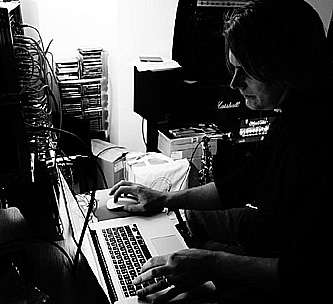 Andrew
Ostler: Darkroom was formed in 1996, though it was known as Collective
at the time. Even when “Search Engine Optimization” wasn’t
a thing we realized Collective was a poor choice of name, so changed
to Darkroom in 1998 for our first releases on the 3rd Stone label.
Andrew
Ostler: Darkroom was formed in 1996, though it was known as Collective
at the time. Even when “Search Engine Optimization” wasn’t
a thing we realized Collective was a poor choice of name, so changed
to Darkroom in 1998 for our first releases on the 3rd Stone label.
To date we’ve released about 10 albums and a couple of EPs, plus
a fair amount of other material - including edited live recordings
- via Soundcloud and Bandcamp
and our podcast.
The current Darkroom sound is a direct - but obviously lengthy - evolution
of where we began - improvised, at least to begin with, sound collages
based on electronics and guitar. Technology changes have enabled some
of that evolution. For example, using a laptop instead of a bunch
of CD Walkman's, but other changes have come about by introducing
new instruments into the mix - notably, from my side, my modular synth
and my bass clarinet.
Michael Bearpark: Darkroom formed to produce a short film soundtrack
that would be part improvised over a recorded backing. Imagined soundtracks
and combining improvisation with painstaking editing and post-production
have become central to our music now.
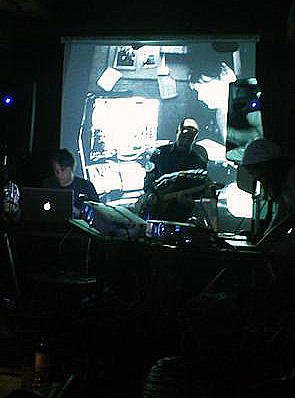 mwe3:
What were the key events that led to the recent Darkroom album release
of Gravity’s Dirty Work and how would you compare Gravity’s
Dirty Work with your earlier CD and album releases? Are your earlier
albums in print on CD and are downloads and free music in general
hurting physical album sales? Is vinyl a viable option for certain
markets? Vinyl did put me through heaven and hell in the 1970s, although
cassettes are making a comeback from what I hear.
mwe3:
What were the key events that led to the recent Darkroom album release
of Gravity’s Dirty Work and how would you compare Gravity’s
Dirty Work with your earlier CD and album releases? Are your earlier
albums in print on CD and are downloads and free music in general
hurting physical album sales? Is vinyl a viable option for certain
markets? Vinyl did put me through heaven and hell in the 1970s, although
cassettes are making a comeback from what I hear.
Andrew Ostler: Answering very literally, the key event that
led to Gravity’s Dirty Work was the completion of our
previous album, Some Of These Numbers Mean Something. As Mike
will attest, I like to release and move on.
More so than in previous releases, I think Gravity’s Dirty
Work is the logical descendant of Some Of These Numbers Mean
Something. It’s the same general approach, but taken a degree
further in terms of polish and shaping into a coherent whole.
Michael Bearpark: With the album Some Of These Numbers Mean
Something, I could instantly hear something new for us - a bigger
and more accessible sound. Everything came together so naturally,
keeping all of the excitement of the original improvisations. Gravity’s
Dirty Work wasn’t so immediate, and took far longer to finish...
it’s still not clear why though! Maybe we took that version of
our process to the limit. The result is a deeper, layered sound, and
a different emotional connection… there’s a lot in there
that’ll reveal itself gradually, and make the album worth listening
to repeatedly for anyone who has time.
A big part of finishing the album was realizing that it was a double,
and should be structured into 4 ‘sides’. Then it was only
a short step to thinking we should get a double gatefold cover designed
and press the album up in a limited double vinyl edition, as well
as CD. Both are there because there’s an audience for beautiful
looking and sounding physical music, which has also allowed our collaborators,
shop and label Burning Shed to grow and prosper over the last decade.
But we have an audience that buys downloads too.
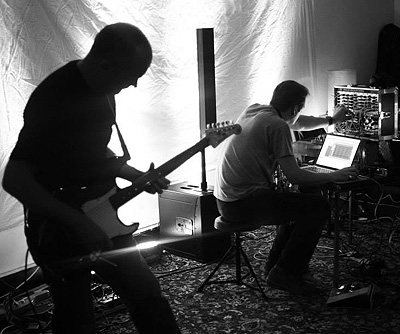 There’s
such a lot of music available now, new and reissued. That presents
challenges... but I don’t sense any long-term loss of enthusiasm
for music itself. We’d still be making this music even if we
weren’t sure there was an audience, but appreciate that it’s
reached out in the world and found an audience who are okay with crossing
genres and finding something special in between. It’s important
for us to play live to find that audience.
There’s
such a lot of music available now, new and reissued. That presents
challenges... but I don’t sense any long-term loss of enthusiasm
for music itself. We’d still be making this music even if we
weren’t sure there was an audience, but appreciate that it’s
reached out in the world and found an audience who are okay with crossing
genres and finding something special in between. It’s important
for us to play live to find that audience.
mwe3: What gear and instruments are you playing on the recording
of the Gravity’s Dirty Work album and what are your favorite
instruments of choice for recording and performing?
Andrew Ostler: On Gravity’s Dirty Work I’m
mostly playing two instruments: modular synth, and recordings of Mike’s
guitar. Apart from maybe one electric piano line that I actually ‘played’,
I subscribe to the idea of my main instrument being the studio itself.
It’s a process that goes way beyond recording or arranging in
any traditional way.
For performance, it’s much the same, but in a more real-time
manner. Everything happens inside Ableton Live on a laptop, but greatly
augmented by my modular, and in recent years, my woodwind. I very
much enjoy my bass clarinet in particular, which has been fitted with
a transducer so it can be integrated into all the recording and effects
processing.
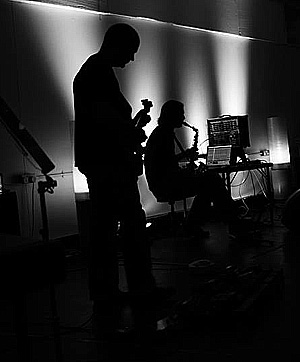 Michael
Bearpark: Touring, as I discovered the hard way, needs reliable
gear that’s regularly serviced and stays in tune, and even then
there are no guarantees. But it definitely rules out some of my favorite
instruments, which are inspiring and have some special character,
partly because they’re so unpredictable. For the recordings I
played guitars through effects pedals and small amplifiers. They’re
the raw source material that Os transforms, but also later additions.
For example, there’s a minimalist section of many overlayed guitars
at the end of the track “Memorianova” because it sounded
incomplete during mixing, and I picked up the closest guitar and my
old Sansamp DI pedal for this one evening, rather than try to explain
what I was thinking. For me it’s about capturing inspiration
and discovery, and the right gear is whatever helps me do that at
the time.
Michael
Bearpark: Touring, as I discovered the hard way, needs reliable
gear that’s regularly serviced and stays in tune, and even then
there are no guarantees. But it definitely rules out some of my favorite
instruments, which are inspiring and have some special character,
partly because they’re so unpredictable. For the recordings I
played guitars through effects pedals and small amplifiers. They’re
the raw source material that Os transforms, but also later additions.
For example, there’s a minimalist section of many overlayed guitars
at the end of the track “Memorianova” because it sounded
incomplete during mixing, and I picked up the closest guitar and my
old Sansamp DI pedal for this one evening, rather than try to explain
what I was thinking. For me it’s about capturing inspiration
and discovery, and the right gear is whatever helps me do that at
the time.
mwe3: Why did you call the album Gravity’s Dirty Work
and can you say something about the cool CD cover art? How important
is a cover to the projection of the product?
Michael Bearpark: The title... partly it’s a human twist
on an abstract scientific idea. But mainly it’s about life, aging
and inevitable loss, not just physical, and the connections that sometimes
hold us back. Although the album’s instrumental, for me that’s
the idea running through it all. “Ahead Finitely” for example
was chosen as an anagram of “A Day In The Life”, and imagines
a last day in sound.
Carl Glover (Aleph Studio) found the cover image for us. It’s
a vision of what the future used to look like, so a link to our previous
album, and it instantly connected with the title and the music for
me. Also with the figures, there’s a story... more than one,
like some of the best Hipgnosis covers. Carl’s restoration of
this moldy old film slide brought out this luminous icon - one that
also fits in the space iTunes leaves these days.
mwe3: How do you record music these days? It seems like a whole
different world compared to 1994. How do computers and recording in
multiple locations impact your sound and vision and what computers
and other programs do you use when writing music and recording?
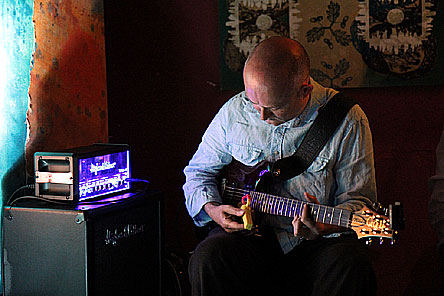 Andrew
Ostler: I use a MacBook Pro running Ableton Live. Live is used
for everything, for performance, recording, arranging and mixing -
it’s been my mainstay since it was released back in 2001. We
have a few go-to plug-ins - including my own creation Augustus Loop.
Lexicon reverbs get a lot of use at the moment too.
Andrew
Ostler: I use a MacBook Pro running Ableton Live. Live is used
for everything, for performance, recording, arranging and mixing -
it’s been my mainstay since it was released back in 2001. We
have a few go-to plug-ins - including my own creation Augustus Loop.
Lexicon reverbs get a lot of use at the moment too.
Michael Bearpark: Digital recording, being able to record in
multiple locations and treating sound like paint are all part of our
approach now. We could still be Darkroom with an open-reel tape deck,
a soldering iron and an editing razor blade, but I’ve been there
and I honestly prefer where we are now. Limitations can be creatively
inspiring - but sometimes they really do just get in the way.
Simon H. Fell recorded his double bass for “A Pair A Part”
separately in the remote French countryside. I recorded Simon Taylor’s
matching trumpet on an Edirol R09 portable recorder in a London rehearsal
room... the same room Andrew Booker’s drums had been recorded
in a year before. We assembled a virtual Nordic jazz quintet as a
result. The level of stop-motion control the technology gave us was
essential; we couldn’t have produced anything like it with everyone
carefully mic’d up in the same room.
We both try to avoid the defaults with the technology we have access
to: if the music has a characteristic sound it’s because we meant
it to. We’ll use both the ultimate reverbs and the lamest fuzz
boxes to do it... maybe even the ultimate fuzz box and the lamest
reverb too. (lol)
 mwe3:
Are you aiming for the New Age market too or a more avant garde /
experimental side of music? Your albums are quite experimental sounding
yet I could see the meditative side of your music as well. Are you
into therapeutic music?
mwe3:
Are you aiming for the New Age market too or a more avant garde /
experimental side of music? Your albums are quite experimental sounding
yet I could see the meditative side of your music as well. Are you
into therapeutic music?
Andrew Ostler: No, I’m not into that at all. Likewise
New Age. I’m not really aiming for anyone other than myself.
Michael Bearpark: We’re not aiming for a specific
market. I don’t have a big problem with the term New Age specifically...
there’s as much Suzanne Ciani as there is Delia Derbyshire in
our music. Also ambient, Krautrock, progressive rock, discredited
for some time, and much else. People hear what they want in our music...
some hear Pink Floyd, and now I can see what they mean, though it
definitely wasn’t by conscious design. We did set out to make
an ambient album, but that was just a starting point - what’s
left is something reflective, but quite different.
For me, music itself is therapeutic and meditative - a wall of loud
guitars, oceans of synthesizer, whatever - the joy of sound! When
I set up to play guitar it doesn’t mean a certain sound is going
to come out. Now I understand that’s disappointing for some,
but it’s always been an inspiration for me.
mwe3: What are your live shows like and where have you done
concerts outside England? What’s your dream venue to perform
a show and have it recorded?
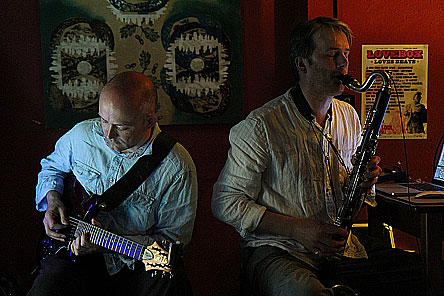 Andrew
Ostler: Our live shows are like a vastly accelerated version of
our album creation process - improvised sources. Mike’s guitar,
my bass clarinet and synth, go into a big melting pot in the laptop,
from which we shape an arrangement.
Andrew
Ostler: Our live shows are like a vastly accelerated version of
our album creation process - improvised sources. Mike’s guitar,
my bass clarinet and synth, go into a big melting pot in the laptop,
from which we shape an arrangement.
Outside the UK, we’ve played in France, Germany, Switzerland
and Belgium so far.
I’m not sure I have a dream venue, or at least, no venue I’ve
ever experienced is my dream venue. It would probably be underground
somewhere.
Michael Bearpark: With Andrew Booker’s Improvizone,
when we were ‘in the zone’ as a quartet we could play for
over an hour without thinking. With Tuesdays Post we’re more
disciplined as a duo, as you can hear here.
These live recordings have been cleaned up a bit and selected so they’re
worth hearing more than once. There’s so much music available
elsewhere, we want anything we put out to have some real value.
Big or small, it’s a great venue when people really listen and
connect with the music, and that in turn inspires us.
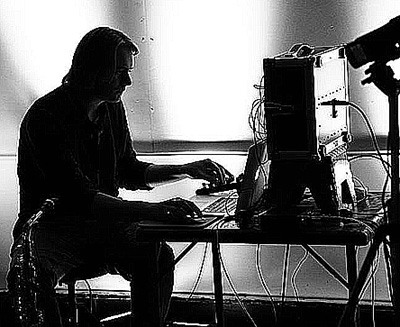 mwe3:
Can you tell us about your musical activities outside of Darkroom?
mwe3:
Can you tell us about your musical activities outside of Darkroom?
Andrew Ostler: I run a small company called Expert Sleepers,
which makes synthesizer modules and audio plug-ins. That brings me
in day-to-day contact with a huge number of musicians, from bedroom
hobbyists to big name producers. I never fail to be impressed by the
wild divergence of style, needs and opinions, even within a such relatively
niche field as modulars.
Michael Bearpark: As a guitarist I’ve a long term
partnership with singer Tim Bowness, featuring on his solo albums
and No-Man collaboration with Steven Wilson. Many of the same musicians
feature in Henry Fool, our celebration of free-spirited 70’s
experimental rock. Tim and Henry Fool played a short tour and festivals
earlier this year, and should be back in 2015 supporting the new album
we’ve just started working on. I’ve other collaborations
too, for example with SONAR guitarist Bernhard Wagner and Brian Eno’s
technologist Peter Chilvers - and still open to more.
mwe3: What does Darkroom have planned for 2014 and into 2015?
And tell us about the new soundtrack to the movie HUM.
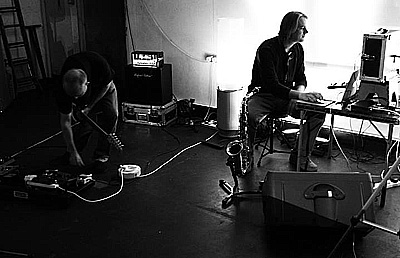 Andrew
Ostler: We co-organize a monthly night called Tuesdays
Post with singer Georgina Brett, which is based in a venue called
The Others in north London. It’s our first residency, which is
something I greatly value, giving us a regular opportunity to flex
our musical muscles and hone our craft. It’s also generating
a great stock of live recordings to feed our Soundcloud page. Speaking
of which, we have a live album almost ready to go, based on recordings
from our mini-tour of 2012, which may see release in 2015.
Andrew
Ostler: We co-organize a monthly night called Tuesdays
Post with singer Georgina Brett, which is based in a venue called
The Others in north London. It’s our first residency, which is
something I greatly value, giving us a regular opportunity to flex
our musical muscles and hone our craft. It’s also generating
a great stock of live recordings to feed our Soundcloud page. Speaking
of which, we have a live album almost ready to go, based on recordings
from our mini-tour of 2012, which may see release in 2015.
And of course HUM should prove an interesting soundtrack project.
HUM is a new short film by award-winning producer Chris Marsh.
For Chris’s last film, Rhombus, we were delighted when
he asked if he could use some material that he’d heard on our
podcast. As the project developed he was using more and more of our
music, including eventually some at-that-time unreleased material
that we sent him. So we ended up providing the soundtrack for the
whole film. For HUM, the difference should be that we’re
able to see the film before creating the music!
 Michael
Bearpark: As well as a soundtrack, a live album that captures
a specific time, and the Tuesdays Post series, we’ve started
talking about our next album and where we’ll start with that...
some new way of reconnecting with what inspired us originally. We’ve
also an EP in progress with Turkish singer/guitarist Hazal Elif Yalvaç
that’ll point us in a new direction before then.
Michael
Bearpark: As well as a soundtrack, a live album that captures
a specific time, and the Tuesdays Post series, we’ve started
talking about our next album and where we’ll start with that...
some new way of reconnecting with what inspired us originally. We’ve
also an EP in progress with Turkish singer/guitarist Hazal Elif Yalvaç
that’ll point us in a new direction before then.
Thanks to Andrew Ostler and Michael Bearpark
of Darkroom



